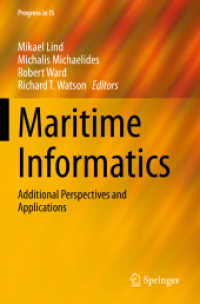- ホーム
- > 洋書
- > 英文書
- > Politics / International Relations
Full Description
Federalism and Federation in Western Europe (1986) analyses the nature of federalism and federation in Europe. It argues that there is an important conceptual distinction between federalism and federation. Federalism is taken to be a multi-dimensional phenomenon arising out of a variety of human experiences, it is a distinctive set of values and attitudes; federation is the organisational expression of this wide diversity. The range of federalism within Western Europe is examined and compared within this conceptual framework. The national case-studies are not only confined to the accepted federations, Austria, Switzerland and West Germany, but also extend to a number of other states which have a variety of federal characteristics. These studies are used to illustrate some of the key themes and issues, and to serve to underline the inadequacies of contemporary federal theory. This approach highlights the two differing Western federal traditions: the Anglo-American, and the West European, and points up the distinctive features of each.
Contents
1. Introduction Michael Burgess 2. Federalism and Federation in Western Europe Michael Burgess 3. Belgium: A Regional State or a Federal State in the Making? Frank Delmartino 4. The New Spanish State Structure Antoni Monreal 5. Federalist and Regionalist Movements in France John Loughlin 6. Federal Ideas in Contemporary Ireland Neil Collins 7. Empire, Ireland and Europe: A Century of British Federal Ideas Michael Burgess 8. The Revitalisation of Federalism and Federation in Austria Richard Luther 9. Constitutional Reform in Switzerland: Task-Distribution, Political Ideas and Financial Interests Ulrich Kloti and Kurt Nussli 10. The Ambivalent Role of the Bundesrat in the West German Federation Tony Berkett 11. Conclusion Michael Burgess








